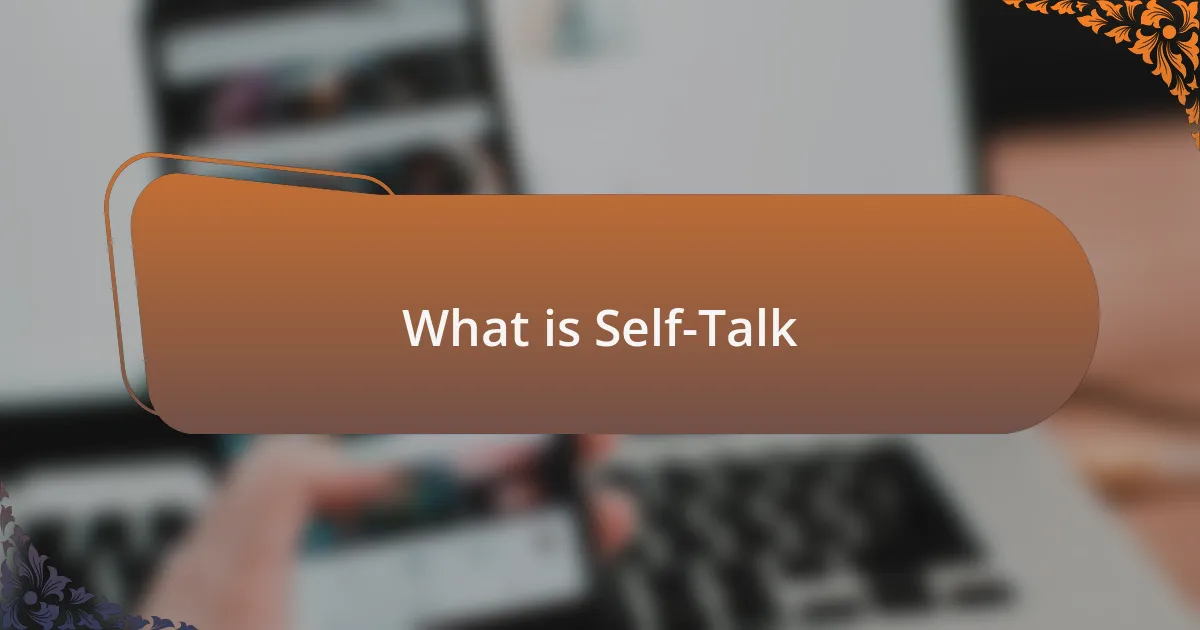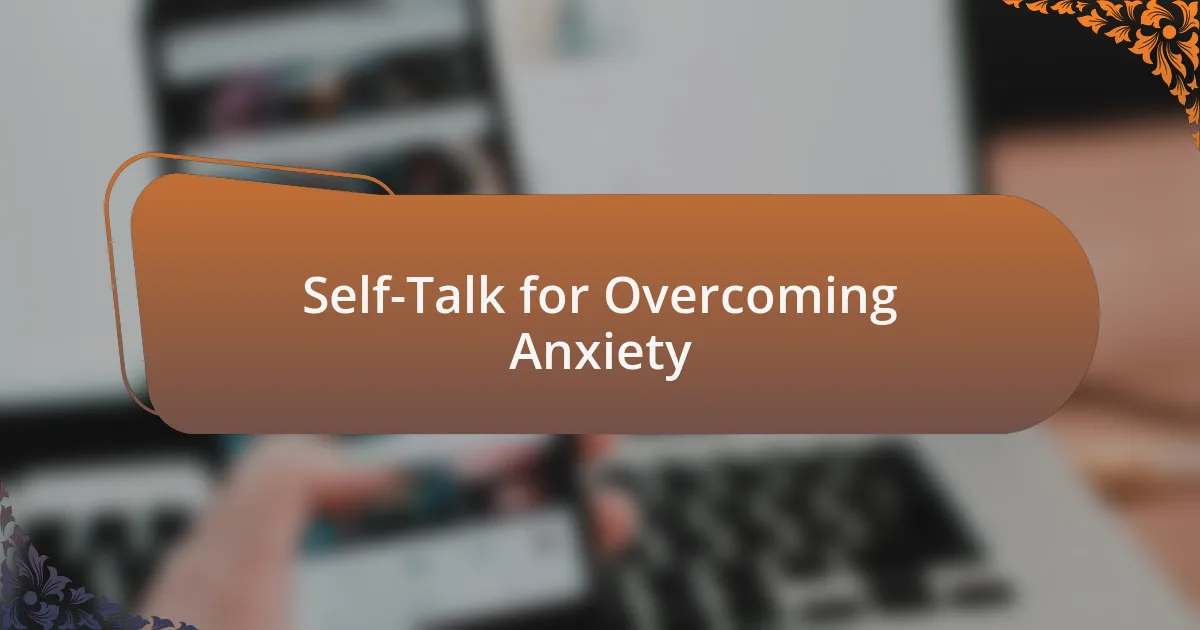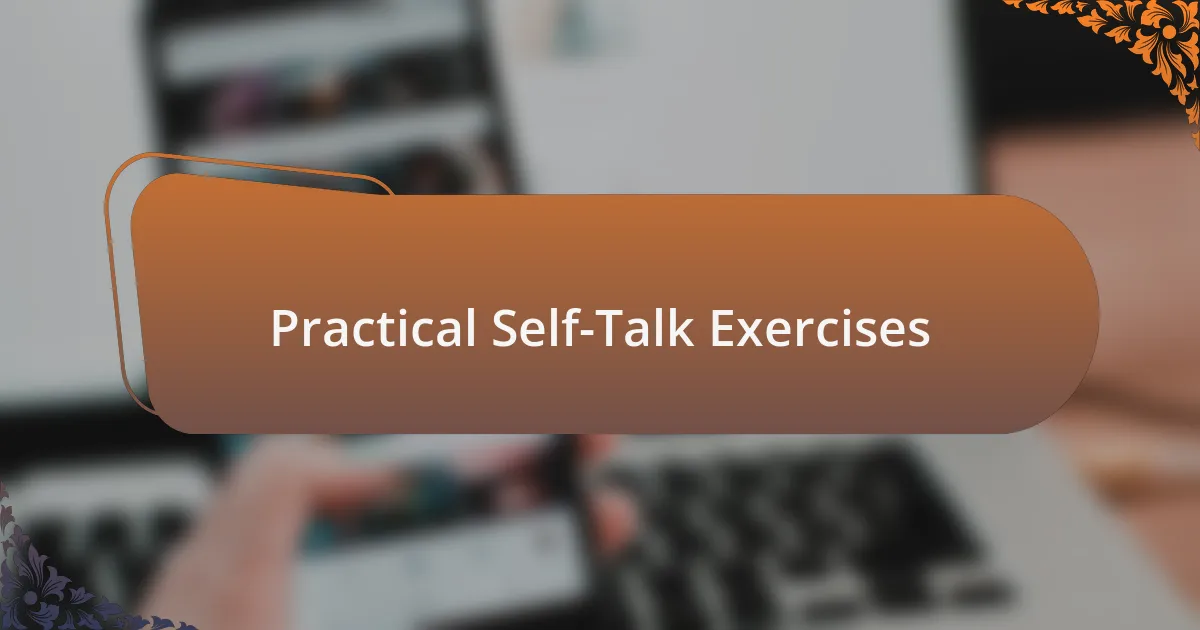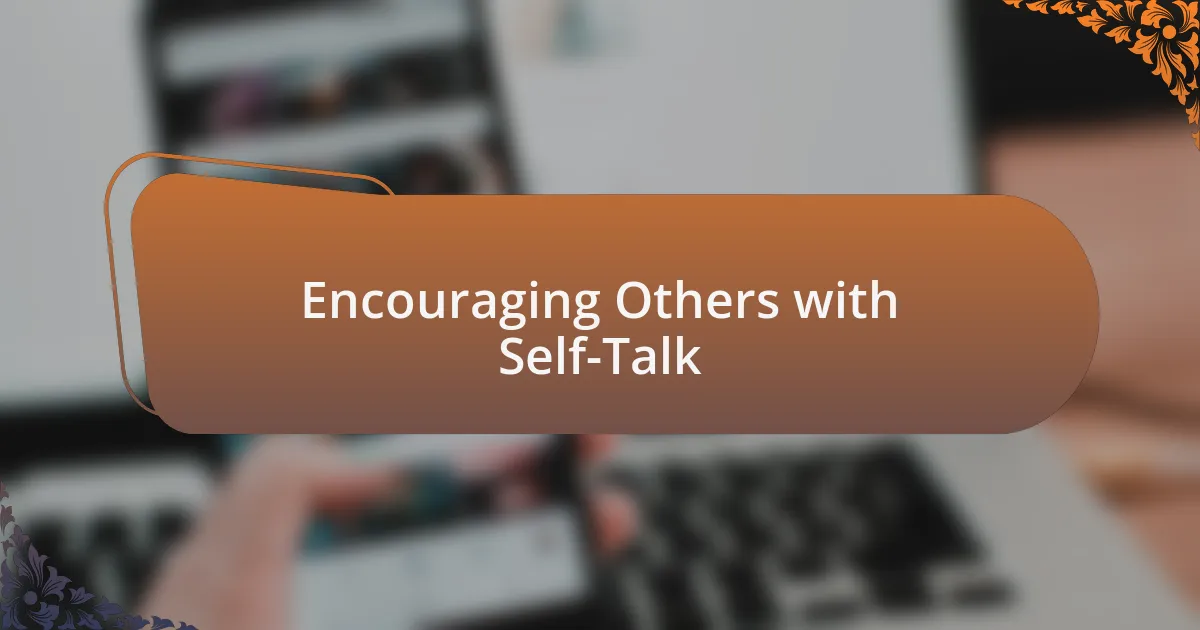Key takeaways:
- Selective mutism is a complex anxiety disorder in children, characterized by a consistent inability to speak in specific social situations, often leading to feelings of isolation.
- Self-talk serves as an important tool for overcoming anxiety and enhancing social interactions, as it can positively influence thoughts and behaviors.
- Practicing self-talk techniques like affirmations and visualization can empower individuals, encouraging personal growth and enhancing confidence in social settings.
- Sharing self-talk strategies with others can foster supportive environments and help transform their self-perception and willingness to engage verbally.

Understanding Selective Mutism
Selective mutism is a complex anxiety disorder primarily affecting children, characterized by their consistent inability to speak in specific social situations. I still remember witnessing a friend’s struggle with this condition; it was heart-wrenching to see their vibrant personality silenced in group settings, despite their eagerness to communicate. It made me wonder: how is it possible for someone so expressive in familiar spaces to become so withdrawn in others?
What often goes unnoticed is the emotional turmoil that accompanies selective mutism. I’ve seen firsthand how it can lead to feelings of isolation and frustration, both for the individual and their families. It raises an important question: why do some children who have the will to speak remain silent? Understanding this condition involves recognizing the interplay of anxiety, social pressures, and nuanced cues that shape their willingness to engage verbally.
As I delved deeper into this subject, I found that selective mutism isn’t just about the inability to speak; it’s tied to the child’s environment and how they perceive it. I recall a time when a child I knew found comfort in familiar surroundings, finally opening up after forming bonds with supportive classmates. It highlighted for me the importance of patience and understanding in helping those with selective mutism to find their voices.

What is Self-Talk
Self-talk refers to the internal dialogue we maintain with ourselves, shaping our thoughts, emotions, and behaviors. It’s a fascinating process because I often find that this mental chatter can either uplift or hinder us. For example, I remember during a particularly challenging time at school, my self-talk shifted from negative to supportive, helping me muster the courage to participate in class discussions despite my anxiety.
The nature of self-talk can vary significantly from person to person. I’ve seen how someone’s inner voice can either amplify their fears or encourage them to step out of their comfort zone. One day, a friend shared how replacing “I can’t” with “I’ll try” transformed their experience in social settings, revealing the power of a simple shift in perspective.
Beyond just thoughts, self-talk can serve as a powerful tool for those grappling with social challenges like selective mutism. I once worked with a child who practiced positive affirmations in front of a mirror before school. This ritual helped them combat anxiety, leading to gradual improvements in their willingness to speak. It made me realize that the way we communicate with ourselves can directly influence our ability to interact with the world around us.

Benefits of Self-Talk Techniques
The benefits of self-talk techniques are profound, especially for individuals dealing with social anxiety or selective mutism. For instance, I remember a time when I felt consumed by doubt before a job interview. I decided to engage in self-talk, reminding myself of my strengths and past successes. That positive dialogue not only calmed my nerves but also shifted my mindset, enabling me to present myself confidently.
Additionally, self-talk can enhance emotional regulation. When I feel overwhelmed, I often take a moment to acknowledge my feelings and then counter them with uplifting phrases. This not only helps ground me but also fosters resilience. Have you ever tried conversing with yourself in a supportive manner? You might be surprised at how much it can change your perspective.
Beyond immediate comfort, self-talk fosters a sense of empowerment. I recall coaching a shy teenager who began using affirmations daily. Over time, their newfound belief in themselves resulted in them not only speaking more in small groups but eventually leading discussions. It’s amazing how this internal dialogue can unlock potential, paving the way for personal growth and social interaction.

Self-Talk for Overcoming Anxiety
Engaging in self-talk has been crucial for me, especially during moments of heightened anxiety. I vividly recall a time at a crowded social event when I felt a wave of panic rise within me. Instead of succumbing to that feeling, I whispered to myself, “You are here for a reason; just take it one step at a time.” That shift in my internal dialogue felt empowering, transforming my anxiety into a manageable challenge.
When it comes to self-talk, the phrases we choose can greatly influence how we handle anxiety. I often remind myself of a mantra I created: “I am in control of my thoughts.” This simple statement acts like a shield against negative spirals. It’s incredible how just a few positive affirmations during anxious moments can turn the tide from fear to focus. Have you ever tried crafting your own mantra to combat anxiety?
I’ve also experimented with visualization during my self-talk sessions. I remember envisioning myself in a safe space while repeating encouraging words. This technique first felt a bit silly, but soon it became a comforting ritual. As I visualized success, my anxiety diminished, allowing me to engage more genuinely with others. Isn’t it fascinating how our minds can create such impactful shifts just through the right words?

My Journey with Self-Talk Techniques
My journey with self-talk techniques began during a particularly challenging time in my life. I recall sitting in my room, wrestling with a knot of frustration and fear before a big presentation. It was in that moment I decided to take a different approach, saying to myself, “This is a moment for me to shine, not hide.” That simple affirmation helped me shift my focus away from my anxiety and back toward my abilities, making all the difference in my performance.
There was one evening where the silence was almost deafening, the pressure to speak felt overwhelming. I remember pacing around my living room while repeating, “I have something valuable to share.” In that moment, the phrasing felt more like a pact with myself than just empty words. It was fascinating to realize how giving myself permission to speak out loud—even when it felt uncomfortable—opened doors to authentic expression. Have you ever found that empowering feeling in your own self-talk?
Over time, I’ve integrated self-talk into my daily routines. I like to start each day with a moment of reflection, often saying, “Today is filled with possibilities.” Some days, I can feel the excitement bubbling just from this simple practice. It’s amazing how a daily dose of positive self-talk can help shape my mindset, making each day feel like a new adventure instead of a daunting challenge. Have you considered starting your day with a personal mantra? You might be surprised by its impact.

Practical Self-Talk Exercises
When I first tried self-talk exercises, I discovered the power of “what if” scenarios. One day, before facing a group, I stood in front of the mirror and said, “What if I connect with them? What if they are more supportive than I expect?” Those questions shifted my anxiety into anticipation, transforming dread into excitement. Have you ever imagined the best-case outcome?
I also found it helpful to jot down positive affirmations at the start of each week. For instance, I wrote, “I am capable and worthy of being heard.” Revisiting these statements gave me a boost when I faced silence or hesitation. The act of writing my thoughts made them tangible and reinforced my belief in my skills. Have you ever tried writing your thoughts down?
One evening, overwhelmed by social situations, I turned to self-talk while relaxing in my favorite chair. I began crafting short phrases like, “It’s okay to take my time” and “I can express myself fully.” Speaking these reminders aloud made them feel real, reinforcing that I had the right to take my space in conversations. It was liberating to hear myself say it, don’t you think?

Encouraging Others with Self-Talk
While encouraging others, I’ve often shared my personal experiences with self-talk, particularly during moments when they felt overwhelmed. I remember a friend who struggled with speaking up in group settings. I encouraged her to try saying, “I am valued, and my voice matters” each morning. Hearing her say these words not only empowered her but also fostered a deeper belief in her potential. Have you ever witnessed someone transform just by changing the way they speak to themselves?
I also make it a point to create a supportive environment for my friends. When I sense someone is hesitant, I suggest they try affirming phrases together. For example, we can stand in front of a mirror and echo sentiments like, “I am enough” or “I deserve to be heard.” I’ve noticed that this collective practice not only strengthens their confidence but also deepens the bond between us. It’s incredible how a few supportive words can shift someone’s perspective, wouldn’t you agree?
In one memorable conversation, a shy acquaintance revealed her fear of public speaking. I shared my self-talk techniques and saw hope light up in her eyes. She began rehearsing phrases like, “I will embrace this challenge,” and soon, we saw her take small but powerful steps to engage in conversations. It’s moments like these that remind me of the profound impact self-talk can have—not just on our own lives but also on those around us. How often do we overlook the simple power of words?